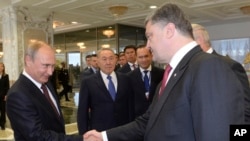Ukrainian President Petro Poroshenko says he has support for a peace plan from all leaders who attended a regional summit Tuesday in Belarus, including Russian President Vladimir Putin.
But hours later, it remained unclear what immediate impact that support would have on ongoing fighting in eastern Ukraine between pro-Russian separatists and Ukrainian forces.
Poroshenko and Putin met face-to-face in Minsk for about two hours in talks aimed at ending the months-long crisis in Ukraine.
Afterward, the Russian leader said Moscow will "do everything" to support a peace plan. But he also said it would be up to the Kyiv government to negotiate cease-fire terms with rebels.
Separately, Poroshenko said a roadmap for cease-fire talks will be prepared as soon as possible.
Earlier, the discussions ended in lists of demands instead of the truce called for by German Chancellor Angela Merkel.
Ukraine's President Petro Poroshenko and Russia's President Vladimir Putin shook hands uncomfortably before heading into peace talks in Minsk, while fighting between Ukrainian troops and Russian-backed rebel fighters appeared to be spreading in eastern Ukraine's Donetsk region.
Poroshenko, speaking in Russian, told delegates that a negotiated compromise is urgently needed: "The fate of Europe and the fate of the world is being decided today in Minsk."
He said that the only effective method for ending bloodshed in eastern Ukraine was enforcing border controls with Russia and stopping the supply of arms to rebels.
Putin insisted that Russians be permitted to meet peacefully with representatives of the Russian-speaking population in eastern Ukraine.
The demand follows several attempts by Russian convoys to deliver what they called humanitarian aid. The Ukrainian government and Western nations believe they may have included shipments of arms to the pro-Russian rebels.
The two leaders, who haven't met face to face since June, were joined by the presidents of Belarus and Kazakhstan and three senior officials from the European Union, including EU foreign policy chief Catherine Ashton.
In opening remarks Tuesday in Minsk, Belarusian President Alexander Lukashenko urged both sides to "discard political ambitions and not to seek political dividend."
Trading accusations
Putin said the Ukraine crisis cannot be resolved through further escalation of force or without launching a peace dialogue with separatists.
He also said the Russian economy could lose some 100 billion roubles ($2.77 billion) if European Union goods reach Russia via Ukraine, bypassing the tariffs Russia levies on EU goods.
"Russia cannot remain idle in such a case and we will simply be forced to take decisive measures to protect our market," he said, adding that would include reversing trade preferences for imports from Ukraine.
Poroshenko responded by defending a peace plan he issued in June, when the rebels in the southeast Donbass region scorned his invitation to lay down their arms and leave by a safe corridor.
He acknowledged that Russia's key demand – further autonomy for the regions of southeastern Ukraine where support for Russia is strong – must be addressed and the ravages of months of violent conflict must be repaired. Poroshenko invited Belarus and Kazakhstan to contribute to a post-war fund for rebuilding southeast Ukraine.
Calls for a secure border
The Ukrainian president said the first step in a political compromise must be agreement on a secure border "as a key element of the country’s sovereignty and independence."
For that, he is counting on help from the Organization for Security and Cooperation in Europe. Effective border controls "are only possible with participation of the OSCE," he said, in order to cut off the flow of military hardware and weapons to the pro-Russian rebels.
Russia, which repeatedly has called for a cease-fire, supports what it calls "a dialogue of national unity" that would boost the autonomy of Ukraine's regions.
But a unilateral cease-fire by Kyiv in June was widely seen by Ukrainians as allowing the rebels a breathing space to regroup. Poroshenko could find it difficult to win support at home for a repeat, especially as government forces have the upper hand.
Kyiv says Moscow has been sending military weapons and vehicles to the Ukrainian separatists for months, and independent reports have tended to confirm those claims.
Russia continues to flatly deny that it is arming the rebels, but officials from Moscow did admit Tuesday that 10 Russian paratroopers had been captured inside Ukraine. Quoting a Ministry of Defense official, Russian state media said the troops crossed the border by mistake.
The risk of outright war between Russia and Ukraine, the two most populous former Soviet republics, has alarmed Washington and its NATO allies, while tit-for-tat sanctions between Moscow and the West are threatening to tip the Russian economy into recession and choke off recovery in Europe.
The unrest in Ukraine began last year when former President Viktor Yanukovych abruptly pulled out of the EU trade deal in favor of a pact with Russia, Belarus and Kazakhstan. Protests erupted, then violence, and Yanukovych fled to Russia.
Overnight attacks
While officials were preparing to meet in Minsk, local authorities in the main rebel bastion of Donetsk said three civilians were killed in shelling overnight as the army pummels insurgent fighters hunkered down there.
The Ukrainian military said 12 soldiers had been killed and 19 wounded since Monday.
At a frontline Ukrainian military position, soldiers said they battle daily with pro-Russian separatists located about 10 kilometers away.
A rocket-launcher site was destroyed in one of the frequent barrages of rebel fire that come daily, according to a young soldier named Oleg.
"You can't tell, it can be in 10 minutes, in 2 minutes or in 24 hours, or shelling all the time from artillery mortars or grad rockets," he said.
Some information for this report was provided by Reuters, AFP and AP.




